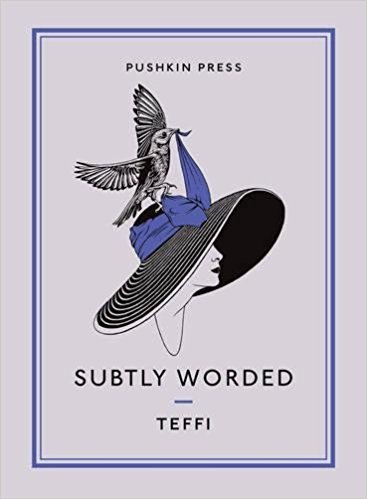 The physical object that is Teffi's Subtly Worded elicits in me a desire for extravagance. The texture of the cover, the deckled edge pages, the small purse-sized shape, the delectable bird pulling upon the woman's hat ribbon—it is all delicious. (I have confessed here to hugging bookcases before; I also hug books.) Content-wise, I was intrigued with what perspectives Teffi, a Russian who fled the Revolution for France and has been compared to Chekhov, might offer.It took me a few years to get through this collection, however. The prose is gorgeous, and I don't fully understand why I couldn't connect with these stories more. They seemed to lack a certain undercurrent. Perhaps they demand rereading. I did not enjoy Chekhov's "Gusev" initially; I only came around on that story when rereading.I decided to finally finish Subtly Worded this past New Year's Eve. Michael and I went to the Fireside Lounge at the Hotel Sorrento (which is one of my favorite places in Seattle; check out their monthly Silent Reading Party). Our waitress had a wholesome yet aristocratic look about her in a cream-colored silk blouse; it seemed somehow fitting to the world of Teffi. There was live jazz and a roaring fire. And a chanteuse with a melodica, which she defined as the love child of an accordion and harmonica. Michael read Hanna Krall's Chasing the King of Hearts, which he adored (another book to add to my WIT pile). My cocktail tasted like chocolate and pine-sap."And Time Was No More," my favorite story in Subtly Worded, is set in a cabin in the woods and moves with a dreamy end-of-life nostalgia. I wanted to copy out nearly every luscious paragraph. Here's one that sums up the theme and impressionistic atmosphere:
The physical object that is Teffi's Subtly Worded elicits in me a desire for extravagance. The texture of the cover, the deckled edge pages, the small purse-sized shape, the delectable bird pulling upon the woman's hat ribbon—it is all delicious. (I have confessed here to hugging bookcases before; I also hug books.) Content-wise, I was intrigued with what perspectives Teffi, a Russian who fled the Revolution for France and has been compared to Chekhov, might offer.It took me a few years to get through this collection, however. The prose is gorgeous, and I don't fully understand why I couldn't connect with these stories more. They seemed to lack a certain undercurrent. Perhaps they demand rereading. I did not enjoy Chekhov's "Gusev" initially; I only came around on that story when rereading.I decided to finally finish Subtly Worded this past New Year's Eve. Michael and I went to the Fireside Lounge at the Hotel Sorrento (which is one of my favorite places in Seattle; check out their monthly Silent Reading Party). Our waitress had a wholesome yet aristocratic look about her in a cream-colored silk blouse; it seemed somehow fitting to the world of Teffi. There was live jazz and a roaring fire. And a chanteuse with a melodica, which she defined as the love child of an accordion and harmonica. Michael read Hanna Krall's Chasing the King of Hearts, which he adored (another book to add to my WIT pile). My cocktail tasted like chocolate and pine-sap."And Time Was No More," my favorite story in Subtly Worded, is set in a cabin in the woods and moves with a dreamy end-of-life nostalgia. I wanted to copy out nearly every luscious paragraph. Here's one that sums up the theme and impressionistic atmosphere:
"Sunset, on the other hand, is always sad. It may be voluptuous and opulent, and as richly sated as an Assyrian king, but it is always sad, always solemn. It is the death of the day."
In the hotel lounge, a young woman strutted her newfound charms (plunging neckline, stilettos) beside her parents. Meanwhile, in Teffi: "At least once in your life you should hear a fox singing."The story turns quite philosophical. A mysterious hunter tells the narrator, "Just think of me as a composite character from your previous life." The philosophical conversation between hunter and narrator got to be a bit too much, but the conceit, this sort of last-day-on-earth mélange of memory, did stick with me. Plus who doesn't want to hear a fox singing?
